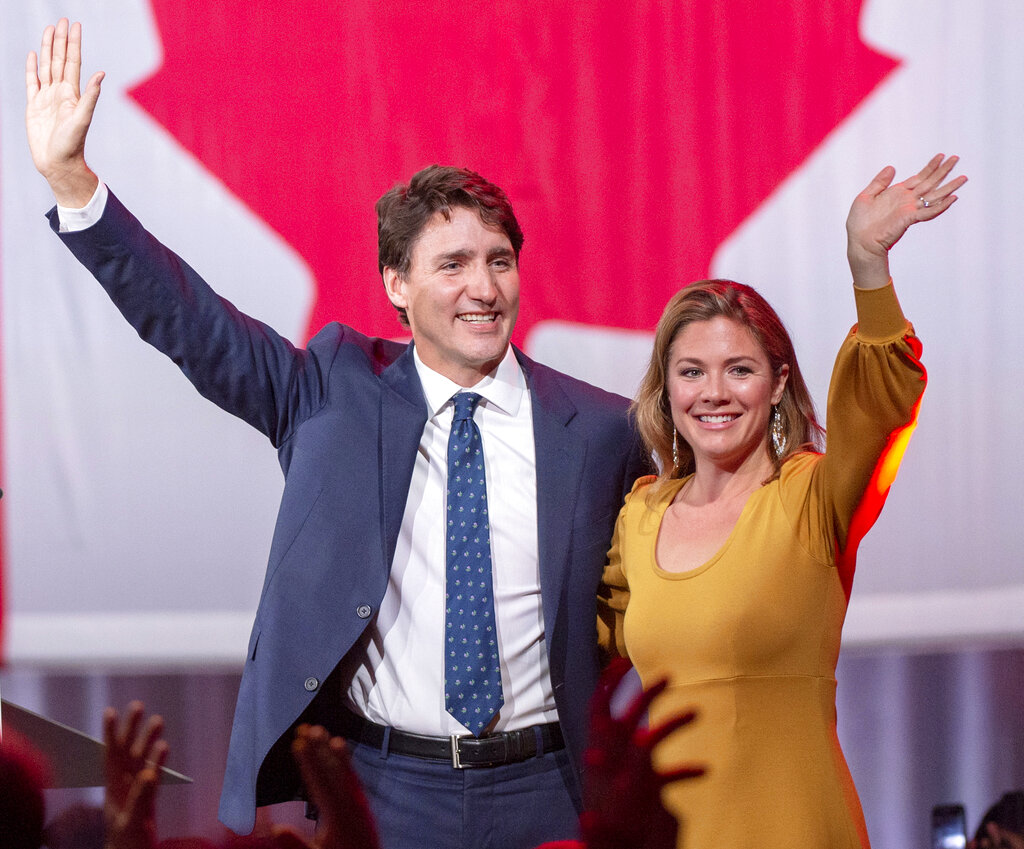Canada’s Prime Minister Justin Trudeau has scraped back to power for a second term. But his Liberal party will form a minority government after a bruising campaign dominated by scandal and personal attacks that blemished the 47-year-old leader’s progressive image and cast doubt on his personal judgement.
Trudeau’s Liberals won 157 seats -- 13 seats short of a majority. This means he’ll have to rely on the left-leaning opposition New Democrats, led by Jagmeet Singh, the first non-white leader of a major Canadian party, or other opposition parties to pass legislation and remain in power. The results were humbling for the Liberal Party which scored a landslide victory when it came to power in 2015, ending nine years of Conservative rule under Stephen Harper.
The telegenic Trudeau was a global superstar when he was first elected, welcomed as a refreshing voice of liberalism, environmentalism, gender equality and ethnic diversity in a world veering toward anti-immigrant populism and authoritarianism. But his showman style and a string of scandals undermined his popularity. Trudeau’s fall from political grace began with a blunder-ridden visit to India in early 2018 where he was roundly mocked for a string of political, cultural and fashion missteps. (When he met Indian movie stars like Aamir Khan who wore dark mustard chinos, Trudeau wore dazzling Indian outfits that critics said were more appropriate for attending a wedding).
Afterwards, Trudeau’s popularity began to seriously tank with allegations he sought to bully the country’s then attorney-general, Judy Wilson-Raybould, to go soft in the corruption prosecution of engineering giant SNC-Lavalin Group, a major corporate presence in Trudeau’s home province of Quebec. Canada’s ethics watchdog later ruled Trudeau violated the country’s conflict-of-interest law.
With the economy buoyant -- unemployment is at its lowest in nearly half a century and the economy is quickly transforming into a technological heavyweight from dependence on polluting natural resource industries -- the 40-day election campaign swiftly became fixated on personalities and scandal. Trudeau’s re-election campaign suffered a nearly fatal blow after photographs emerged from two decades earlier of him “browned up” as Aladdin wearing a turban at an Arabian Nights-themed costume party at the school where he taught (he was the drama teacher). Trudeau apologised repeatedly to voters, saying while he realised now the action was racist, he did not perceive it to be so at the time. Photos of Trudeau wearing “brownface” on other occasions -- one of him sporting an Afro wig, surfaced later, fuelling the controversy.
While Trudeau conceded after the results were counted that “it’s always possible to do better,” his tone on election night was frankly jubilant. “Canadians rejected division and negativity,” he told cheering supporters in his Montreal base. “We seek hardship for none and prosperity for all, and if we unite around these common goals, I know we can achieve them,” he said.
In Canada, minority governments don’t necessarily equate with political instability. In fact, the last 20 Canadian federal elections, going back to the 1950s, have produced nine minority governments which have often been praised as the busier and more productive than majority administrations. Most recently, the Conservatives, under Harper, governed for nearly six years, as a minority government.
The Conservatives’ new leader, Andrew Scheer, whose party finished in second place with 121 seats, eschewed any conciliatory note in his concession speech, telling party backers: “I put Justin Trudeau on notice -- his leadership is damaged and when his government falls, Conservatives are ready and we will win.”
Scheer had run a campaign pledging to axe CAD $34bn from government spending. He’d been vague about where the axe would fall but promised voters income tax cuts as a sweetener. He also planned to end anti-pollutant taxes on fossil fuels and scrap environmental impact assessments for pipelines, leading Trudeau to joke his Conservative opponent planned to make “pollution free again if he gets elected.” The Conservative leader had also come under heavy attack from the Liberals for repeatedly refusing to eject party members for racist or homophobic statements.
Trudeau, who works crowds not with erudite speeches like his intellectual father Pierre Elliot Trudeau, who was also a Liberal prime minister, but with personality and boundless enthusiasm, has a lot of hard work to do to recapture support in terms of popular vote. The Liberals got just 33.1% of the popular vote while the Conservatives nabbed 34.4%. But because of Canada’s first-past-the-post system, the Liberals emerged with the most seats. Trudeau’s standing remains particularly strong among immigrant communities in Canada where he’s warmly welcomed both refugees and foreign skilled employees.
The Liberal victory still exposed deep geographical fissures in voting patterns as the party did not win a single seat in the western provinces of Alberta and Saskatchewan. Voters in the oil-rich province of Alberta were particularly irate over the government’s slow progress on an important crude oil pipeline to deliver oil to the West Coast that’s been vociferously opposed by environmentalists. In a bid to start healing the electoral divisions, Trudeau said, “We will govern for everyone. Regardless of how you cast your ballot, ours is a team that will fight for all Canadians.'
While the New Democrats under Singh may end up as a key power broker in Ottawa in propping up the government, it was a disappointing election night for the party which saw its seat-tally nearly halved to 24 from 44. Another surprise was by the resurgence of the Bloc Quebecois, dedicated to independence of French-speaking Quebec, that emerged as the third-largest party with 33 seats.
In the end, political analysts said voters looked past Trudeau’s missteps and elected him back into office because they disliked his Conservative rival, Andrew Scheer, even more than they disliked the Liberal leader. Montreal McGill University political science professor Daniel Beland told Canada’s CBC network Trudeau's weakened mandate capped an uninspiring campaign that was more about “who not to vote for than who to vote for.”











